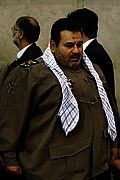Psychological Operations Command Launched for June 12 Anniversary
» Firuzabadi: Don’t be Fooled by the Media
While the request by Mir-Hossein Mousavi and Mehdi Karoubi for a June 12 march on the first anniversary of last year’s disputed presidential election in Iran has been widely supported by a range of reformist groups, Iran’s top military commander Hassan Firuzabadi yesterday signaled the reactivation of the Psychological Operations Command of Iran’s armed forces by visiting the headquarters and spoke of “moderate reformists” who he said are showing signs of affinity to the regime and called on the public not to be “deceived” by the media.
Firuzabadi expressed satisfaction over the events commemorating the passing of ayatollah Khomeini last week and said, “The unity of the conspirators has been disrupted thanks to the events of the 4th and 5th June, and public alertness.”
Returning to the Psychological Operations command, Firuzabadi also said, “Mousavi has been trapped in cyberspace created by the US, Britain, the Zionist regime and counter-revolutionaries, is moving towards destruction. The reformist sheikh [a reference to Mehdi Karoubi] too has been isolated in the dreams of the green movement.”
The commander then directed his talk at other dissident groups and asserted that, “The Freedom Movement is still the leader of the US position and is the instigator of the conspiracy inside the country as it tries to perpetuate the situation while revolutionary students and politicians are aware of their ways. Moderate reformers are gradually moving towards the regime and the Imam’s line and their new policy is to work within the regime.”
This ayatollah Khamenei-appointed commander attempted to appear optimistic about the weaknesses of the opposition and said, “There are no signs of their return to unity and combatant clerics want activities to stay within the regime. So it is possible that imperialist and foreign media may publish inaccurate information about these movements and the public and your dear youth should not be deceived by the media.” Firuzabadi’s reference to lack of unity among the leaders of the opposition comes at a time when Mousavi and Karoubi jointly requested the ministry of the interior to issue a permit for a march on June 12, as the two met last week. The two opposition figures had said that should authorities not issue the requested permit for the march, then the public should use social networks to organize themselves for the peaceful march. Eight political groups made a formal request to the ministry of the interior. Disunity in the opposition is a theme that government authorities have been advancing for the past few weeks, and more so as June 12 approaches.
Basirat website, an official outlet of the Islamic Revolutionary Guards Corps, IRGC, recently wrote, “The heads of reformist parties were not willing to join the two leaders of the conspiracy [i.e. Mousavi and Karoubi].” The same story also said that Mousavi and Karoubi had personally requested the leaders of some of the eight groups to submit their requests for a march on the election anniversary on June 12. This publication also said that any steps to hold rallies on June 12 would be “insulting to the absolute religious leader and opposition to him,” and also undermining the national security of the country.
The psychological operations command of the armed forces was formed in 2009 as the presidential campaign picked up heat. On it sit representatives of the armed forces, ministries of foreign affairs, culture, science, communications, defense, IRGC, police, national radio and television, IRGC’s university, Tehran municipality, the national defense university, Malek Ashtar University, and other government or semi-government organizations. At its first session, the cultural deputy of the armed forces had said that the purpose of the command was to “organize a seminar regarding confronting the soft operations of the enemy,” but the command has remained in place after the seminar and continues its operations more than ever today. Semi official Fars news agency quoted the secretary of one of the sessions of the seminar as having said that the enemy had opted to use cyber operations because they were less expensive and more effective, concluding that “we too would use the same tool.”
It should be noted that this is not the only group that links the armed forces to the government. In 2008, a committee comprising the armed forces and the government had been formed as well, which included such individuals as the secretary of Iran’s national security council Saeed Jalili, and representatives from the foreign ministry, national security, and defense establishments.
In the words of Guards general Saeed Mojaradi, “Battling and managing economic sanctions, in addition to cultural invasion issues are among the duties of this joint military and government command.”


